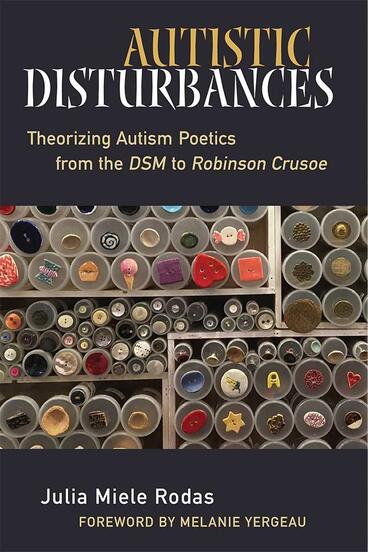Autistic Disturbances
Theorizing Autism Poetics from the DSM to Robinson Crusoe
Finds and investigates the resonances between autistic speech patterns and literary texts
Description
While research on autism has sometimes focused on special talents or abilities, autism is typically characterized as impoverished or defective when it comes to language. Autistic Disturbances reveals the ways interpreters have failed to register the real creative valence of autistic language and offers a theoretical framework for understanding the distinctive aesthetics of autistic rhetoric and semiotics. Reinterpreting characteristic autistic verbal practices such as repetition in the context of a more widely respected literary canon, Julia Miele Rodas argues that autistic language is actually an essential part of mainstream literary aesthetics, visible in poetry by Walt Whitman and Gertrude Stein, in novels by Charlotte Brontë and Daniel Defoe, in life writing by Andy Warhol, and even in writing by figures from popular culture.
Autistic Disturbances pursues these resonances and explores the tensions of language and culture that lead to the classification of some verbal expression as disordered while other, similar expression enjoys prized status as literature. It identifies the most characteristic patterns of autistic expression-repetition, monologue, ejaculation, verbal ordering or list-making, and neologism-and adopts new language to describe and reimagine these categories in aesthetically productive terms. In so doing, the book seeks to redress the place of verbal autistic language, to argue for the value and complexity of autistic ways of speaking, and to invite recognition of an obscured tradition of literary autism at the very center of Anglo-American text culture.
Julia Miele Rodas is Professor of English, Bronx Community College, CUNY. Her website is https://juliamielerodas.com/.
Reviews
"Julia Rodas rejects ableist repertoires of what language is and can mean, notably the understanding that language necessitates understanding or intelligibility . . . readers are viscerally confronted with autism's many possibilities, are given neurodivergent mechanisms through which to re-see Villette, Frankenstein, Robinson Crusoe, and more . . . What Autistic Disturbances offers is at once a method and a style for apprehending aesthetic autism, across genre and mode. This is an incomparable book, one brimming with ideas for how to reclaim autistic echoes in a morass of literary expression."
—Melanie Yergeau, author of Authoring Autism
"Autistic Disturbances thoroughly and engagingly examines what Julia Miele Rodas terms 'autism poetics' in the anglophone cultural canon, from the eighteenth to twentieth centuries. ... Developing her own framework for categorizing the concept of autistic language, or autism poetics, she re-negotiates the pre-existing diagnostic language of medical researchers both to describe these categories and reclaim the terminology in a manner fitting to disability studies scholarship."
- Rachael Nebraska Lynch
-- Journal of Cultural and Literary Disability Studies
"An important book that makes significant contributions to the study of autistic language in the humanities and, in particular, literature."
- Ralph James Savarese
--Ralph James Savarese, author of Reasonable People
"Anyone seriously interested in disability studies should have a copy of Autistic Disturbances on their shelf. There is much in the to excite the interests of students of eighteenth and nineteenth century literature, as well. It covers previously foraged terrain in a new and interesting way."
- Wordgathering
--MIchael Northen, Wordgathering
News, Reviews, Interviews
Read: Autistic Disturbances reviewed in Public Books (Link) | 9/23/2019Read: Autistic Disturbances reviewed in the LA Review of Books (Link) | 5/2/2019Listen: Interview on Inside Voices
Listen: Julia Miele Rodas interviewed for the New Books Network (Link) | 9/3/2018

